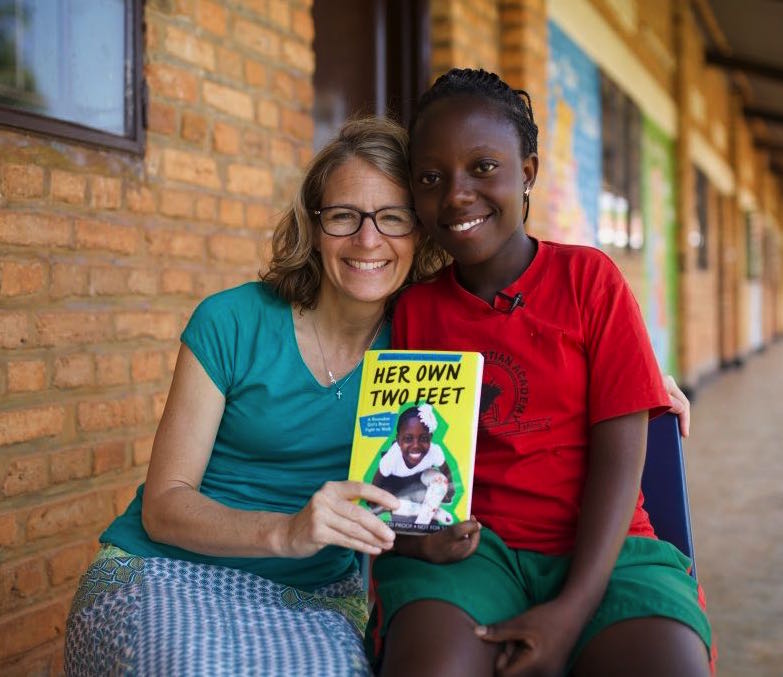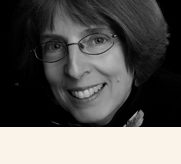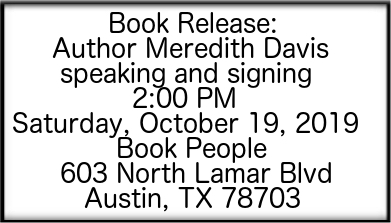I’m still choked up after reading Her Own Two Feet, just out from Scholastic’s FOCUS imprint, about a Rwandan girl who comes to America at age nine for surgery to correct her club feet. Written by Meredith Davis and Rebeka Uwitonze, the book includes over 70 photographs from Rebeka’s time in Rwanda and America.
Here to tell us about her writing process is Meredith Davis, but before we get to the interview, hey—I’m giving away a copy of Her Own Two Feet signed by both authors! (Meredith had Rebeka’s signature made into an ink stamp. How cool is that?) Hop to the end of this interview to enter the giveaway, then come on back to hear what Meredith has to say about writing this heartfelt book.
A. B. Westrick: Meredith, welcome to my blog!
Meredith Davis: Thank you, Anne. It is such a thrill, after rooming together during our time at VCFA and sharing so many hopes and dreams, to be interviewed by you now. I am a big fan of A. B. Westrick!
ABW: Fandom goes both ways. Rooming with you was great! I’d love to say more about VCFA, but today we’re here to talk about your book. (Woot! Woot!)
And I want to start with a video your publisher created. I enjoyed hearing what you had to say, plus hearing a few words from Rebeka at the end of the clip.
Now tell me about the title. I’m asking because in many chapters, you note that Rebeka and members of her family often say, “Chance comes once,” and the story is very much about Rebeka taking the chance when it comes—the chance to travel to America where a doctor might fix her twisted feet. I thought Chance Comes Once would make a great title, and from an audio clip on your website, I learned that it was the original title. But along the way, clearly, the title was changed. Can you tell us a bit about the reason for the change, and how you felt about it?
MD: That’s a great question! Yes, the original title was Chance Comes Once, because that phrase is a big part of Rebeka’s story. One of the beautiful things about publishing is that it is a collaborative effort with everyone bringing their own particular strengths to the table. Scholastic’s marketing department wanted something that was about feet or standing or walking, so that it would be immediately apparent from the title what this book would be about. We went back and forth with various titles and subtitles and when we landed on this one, we were all happy with it.
The phrase “chance comes once” is still used a lot. It’s on the jacket copy and crops up in early reviews (like this starred one from Publisher’s Weekly). I’ve got a school presentation called “Chance Comes Once,” and I’ll have “Chance Comes Once” rubber bracelets written in both English and Kinyarwanda in the three colors of the Rwandan flag to pass out at the book launch party.
ABW: Oh, that’s great. And let’s put in a plug for the party! Readers who live in Austin, TX, are invited to Book People on Saturday, October 19, 2019, at 2:00 PM. Meredith will be speaking and signing books.
Now let’s talk about your writing process! Her Own Two Feet is in close third person from Rebeka’s point of view. How hard was it for you to get inside Rebeka’s head to present the story through her eyes? Did you ever worry that you might mischaracterize her feelings or perceptions?

MD: It took a lot of interviews, asking the right questions, and going back as the book progressed to ask more questions to get as close to Rebeka’s thoughts and motivations as possible. We slipped into first person in the vignettes between each chapter where she “talks” to her little sister Medea. To make sure I didn’t misrepresent anything, I had a Rwandan friend translate the entire book into Kinyarwanda, so that Rebeka and her parents would hear every word in their native language and make sure it was right. There were moments where Rebeka didn’t have clear memories of how she felt or why she had done a particular thing. When that happened, she and I would discuss the scene and find language that worked. Ultimately, getting confirmation from Rebeka and her parents squelched any worries I had about getting it right.
ABW: I really enjoyed those sister-talks at bedtime. And it’s great to hear that you arranged for the whole manuscript to be translated into Rebeka’s native language to make sure you had it right. What an in-depth process!
How many years after Rebeka returned to Rwanda did you travel there to interview her and others in preparation to write the book? How would this book be different if you had not been able to travel to Rwanda?
MD: Rebeka went home in June 2013, and I took the plunge and booked a plane ticket to Rwanda in the summer of 2017. It was risky. I had no idea if the story would sell, and that’s what I told Rebeka when I asked if she would be my co-author. She was all in, and so we pressed forward.
On that first trip there were dozens of interviews with Rebeka, her parents, old teachers, the staff of the organization (Africa New Life) that arranges for sponsorships so kids can go to school, and more. Rebeka and I talked about the shape of the manuscript, what scenes to include, and where to start and end it. Over the course of the next year there were lots of emails, and a few Skype calls to Rwanda. The summer of 2018, I traveled back to Rwanda with recordings of the book to see if we had covered it all. By this time, Scholastic had expressed interest and my editor had some questions and edits that Rebeka and I addressed.
This book would not be the same without all those trips to Rwanda. I had visited five times before writing the book, and the tally has risen to eight. I now know how Rebeka’s village smells and looks and feels. I’ve sat in her home and held her sisters on my lap, hugged her parents and admired the paper snowflakes that were hanging from her ceiling. I was really fortunate to have had the opportunity to experience the country firsthand.
ABW: Oh, yes—gotta love those snowflakes!
How many revisions did the book go through before it was ready for publication? Can you give us an example of a moment you changed after showing Rebeka a draft of the book and getting feedback from her?

MD: The book went through two big revisions with my agent before we sent it to publishers. We got an offer after just a few weeks and made minor revisions after that. Since Rebeka lived across the ocean with limited access to a computer and no cell phone, if I wanted to contact her, I had to make arrangements with her boarding school to pull her into the office for a Skype call. I had to take into account time differences and the fact that her education was more important than our book project!
When making revisions, I relied heavily on interviews from 2017 and stories Rebeka had shared with me. On my trip in 2018, I showed her all the changes I’d made and I gave her final say on all edits. We are co-authors, and the story is Rebeka’s as much as it’s mine. If she didn’t like anything, we edited or cut it.
One of Rebeka’s specific edits strengthened an early scene in the book. She had told me about a clinic her parents took her to—a place where she lived for eight months for treatments to try and turn her feet. When she saw the scene the way I’d drafted it, she remembered more details, such as her mother tying up her legs before they traveled to the clinic. Her mother hid Rebeka’s twisted limbs because she needed to flag down a moto to get to a bus, and she knew that some drivers would have been afraid to take Rebeka, if they’d seen her feet. They would have thought she was cursed. Adding those details to the scene made it much richer.
ABW: The details really bring that scene to life. I hurt for Rebeka, and the moment pulled me into the story.
The opening pulled me in, too, and I wanted to ask how you decided to open with that scene, showing the challenges Rebeka faced doing something as basic as getting to the latrine. Were there other openings you considered and decided against?
MD: Yes, at first we had a different opening, and we changed it. The first opening was the scene where Rebeka’s mother carries her to the road. It introduced her disability, but we wondered if we could do even more with our first few pages. I remembered that when Rebeka lived with us, she would talk about how scared she was to go to the bathroom at night because there were wild dogs roaming about. When I visited in 2017, she showed me the yard behind her house, the door where she would exit and the distance she would crawl to get to the latrine. Spread on the ground was a blanket covered in dried maize, and I imagined how that would hurt if it dug into Rebeka’s knee as she crawled. It felt like a more compelling place to start, and Rebeka agreed, so we moved the scene where she’s carried by her mother to the road to Chapter Four.
ABW: Great decision. The opening really works.
Okay, new question: years ago, when we were roommates at VCFA, you were working on middle grade fiction and picture books. I’m going to assume that your study of fiction helped you craft this book—narrative nonfiction—but can you say a bit about that? What elements of fiction-writing helped you bring Her Own Two Feet to life?

MD: My time at VCFA made my writing so much stronger, and it also gave me confidence to step outside my comfort zone. To satisfy an assignment when I took the picture book intensive during my second semester (shout out to Kathi Appelt, an amazing teacher and writer), I wrote a biography of Margaret Wise Brown, the author of Goodnight Moon. That little project was a baby step towards narrative nonfiction. I saw that I could research, take what I learned, and craft it into a story.
ABW: Oh, yes! Kathi Appelt. An outstanding mentor. She was my advisor for my last semester when I was working hard on the novel that became Brotherhood. If it hadn’t been for Kathi, well, let’s just say it might have been years before I got a publishing contract. But back to you! Tell me about learning to write narrative nonfiction.
MD: The first time I wrote a story about Rebeka, it was a picture book. My agent loved it, but sensed that there was more to tell. She encouraged me to try it as middle grade. I resisted. As you said, I had only written middle grade fiction. I didn’t know enough about Rebeka’s story to expand it from a picture book to a novel. But my agent’s enthusiasm nagged at me and the confidence I’d gained at VCFA enabled me to take a chance. I decided to try writing a rough draft with what I knew and see how it felt.
I submitted the draft to my agent, who said it was good, but she still had lots of questions. (So did I.) By this time, the story had hold of me and I knew that even if it never got published, I wanted to learn more. And I knew I would need Rebeka to be my co-author. Together, we did it, because . . . chance comes once! All that I learned about fiction writing, from engaging the senses and building a world to using objective correlatives (such as the mango) and crafting a satisfying ending—all of it came into play as the story came together.
ABW: I love it. And for readers who don’t know what an “objective correlative” is (before VCFA, I’d never heard the term), in 2017 I wrote this blog post on it.
Now, let’s wrap up this interview with a bit about future projects. Are you now hooked on nonfiction? What are you currently writing?
MD: I would never have thought I’d write another narrative nonfiction, and yet the story that is calling to me is just that. I love the words “based on a true story.” And so my next project is based on a true story as well, a story I have lived, with characters I know intimately. It is an entirely different kind of story but rooted in the same desire Rebeka and I have with Her Own Two Feet: to encourage empathy and crack open hearts to love others well.
ABW: Excellent. I look forward to reading it. Thank you so much for doing this interview, Meredith!
ABW: Readers who want to know more about Her Own Two Feet can find lots of information and photos on Meredith’s website. Also, you can follow Meredith on facebook, Instagram, and Twitter, and if you do, be sure to let me know in the Rafflecopter below. Every entry earns you a chance to win a signed copy of Her Own Two Feet. You can enter every day up until the deadline: Friday, October 18, at 11:59 PM. Good luck!



What a wonderful story, a tangible way to help a child who lived far away. I hope this book will be in every library in the US. The children and adults sections.
Agreed. Every library needs to put this book on the shelf!
Great interview! What a story! And that video!
Meredith, how did Rebeka come to live with your family?
Meredith answers that question in the book! Sign up for the giveaway and maybe you’ll win the signed copy. (Rafflecopter will choose a winner randomly.)
When I curled up in a chair with this book, I couldn’t put it down. I was in a cafe and devoured the whole thing in a few hours while occasionally stopping to blow my nose. (I remember trying hard not to sniffle too loudly because I didn’t want to bother the people around me or call attention to myself.) Don’t get me wrong — it’s a happy story. But being nine years old and going through what Rebeka had to go through — the story just choked me up.